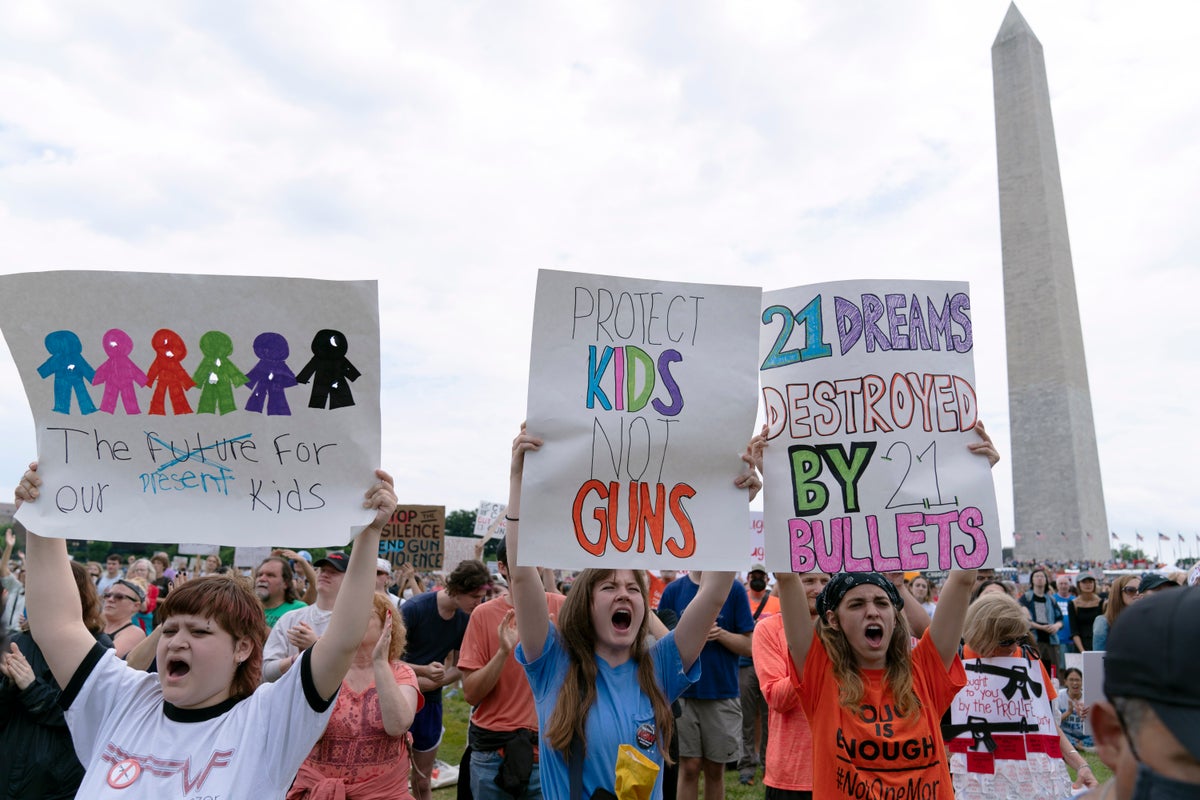
The outline of a bipartisan Senate agreement to rein in gun violence has no game-changing steps banning the deadliest firearms. It does propose measured provisions making it harder for some young gun buyers, or people considered threatening, to have weapons.
And there are meaningful efforts to address mental health and school safety concerns. It all reflects election-year pressure to act both parties feel after mass shootings in May killed 10 people in Buffalo, New York, and 21 more in Uvalde, Texas.
Details of the plan remain in negotiation between Democrats and Republicans, with disagreements over how tightly the initiatives should be drawn. That means the proposal's potency — and perhaps whether some parts survive — remain undetermined as it's translated into legislation.
Here's what's in and out of the agreement:
A STRENGTHENING, NARROWLY, OF BACKGROUND CHECKS
When people age 18 to 20 try buying firearms, the required federal background check would for the first time include their juvenile crime and mental health records. To allow time for getting data from state and local authorities, the process' current three-day maximum would be extended up to seven more days, according to aides following the talks. Once the 10 days lapse, the buyer could get the weapon, even if the record search is incomplete.
Currently, dealers considered in the “business” of selling guns are required to get federal firearms licenses. Such sellers must conduct background checks. Bargainers want to cover more people who, while not running a formal business, occasionally sell weapons.
OTHER MEASURED CURBS
The framework calls for grants to help states enforce or enact “red flag” laws that let authorities get court orders temporarily taking guns from people deemed dangerous. Nineteen states and the District of Columbia have such statutes, but some lack funds to enforce them robustly.
Penalties would be toughened for so-called straw purchasers, those buying guns for others who don't qualify. More current or former romantic partners convicted of domestic abuse, or targeted with restraining orders by their victims, would be barred from getting guns. The ban applies today if the couple was married, lived together or had children together.
Inclusion of the tougher restrictions against straw purchasers and estranged partners were surprises because they’d been blocked by Republicans before.
ADDRESSING BROADER PROBLEMS
Democrats say there will be billions of dollars to expand mental health initiatives. This would pay for more community behavioral health centers, strengthened suicide prevention and violence intervention efforts and increased access to mental telehealth visits.
There would be new sums for school safety. These could include better security at building entrances, training for staff and violence prevention programs. The dollar amount is unclear.
HURDLES AHEAD
Democrats responsive to constituents who strongly favor gun curbs want the new law to be as stringent as possible. Republicans want nothing that would turn their adamantly pro-gun voters against them.
This means tough bargaining on the fine print of the legislation.
How narrowly will a new definition of which sellers need federal firearms licenses be written? Are there limits on which juvenile records would be accessible during background checks for younger buyers?
What conditions would states have to meet to qualify for “red flag” funds? What legal protections would people have if the authorities consider them too risky to have firearms?
How much money will the package cost? No one has said, though people familiar with the discussions say a ballpark $15 billion is possible. And how will it be paid for?
A leader of the effort, Sen. Chris Murphy, D-Conn., told reporters Monday that bargainers plan to pay for the costs with offsetting spending cuts or new revenues. The latter could be a no-go for Republicans.
Leaders hope the package can be written and approved before Congress begins its July 4 recess.
WHAT'S OUT?
President Joe Biden has proposed reviving the 1994 assault weapons ban, which expired after a decade, or raising the minimum age for buying one from 18 to 21. He wants to ban high-capacity magazines.
He'd repeal the legal immunity from liability protecting gun makers. He wants safe storage requirements for guns and a federal “red-flag" law to cover states without one.
None of those made it into the bill; nor did universal background checks. Biden backs the agreement anyway in the name of a compromise that would produce an achievement.
PROSPECTS AHEAD?
Ten senators from each party joined in announcing the gun outline and saying they backed it. Those numbers are not a coincidence.
They signal potentially enough support for passage by the 50-50 Senate, where Democrats will need at least 10 GOP backers to reach the usual 60-vote threshold. Besides Murphy, the other lead negotiators were Sens. John Cornyn, R-Texas, Kyrsten Sinema, D-Ariz., and Thom Tillis, R-N.C.
Approval in the Democratic-run House is expected, though complications could always emerge.
MORE RESTRICTIONS?
Another bargainer, Sen. Richard Blumenthal, D-Conn., said he hopes Republicans will see that “the gun lobby is weaker than they think." But there are signs that approving future restrictions will be challenging.
For one thing, this spurt of action on guns is Congress' most significant since the now-expired assault weapons ban was enacted three decades ago. That spotlights how hardened positions can be lasting.
Another clue is the makeup of the agreement's 20 announced supporters. Blumenthal and Sen. Mark Kelly, D-Ariz., are the only two running for reelection this year.
Four others, all Republicans, are retiring in January: Sens. Roy Blunt of Missouri, Richard Burr of North Carolina, Rob Portman of Ohio and Pat Toomey of Pennsylvania.
The rest don't face reelection until 2024 or 2026.
They are Republican Sens. Bill Cassidy of Louisiana, Susan Collins of Maine, Lindsey Graham of South Carolina and Mitt Romney of Utah.
The Democrats are Sens. Cory Booker of New Jersey, Chris Coons of Delaware, Martin Heinrich of New Mexico, Joe Manchin of West Virginia and Debbie Stabenow of Michigan.
Independent Sen. Angus King of Maine, allied with Democrats, also backed the proposal.







